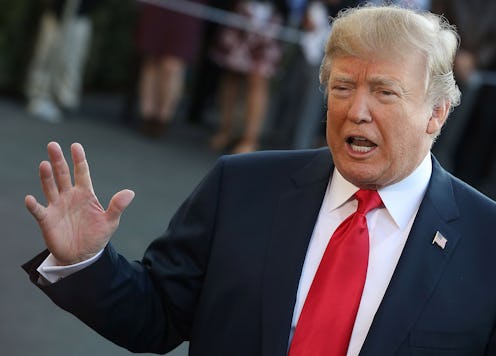
Following Sunday morning's horrific shooting at a Baptist church in Sutherland Springs, Texas, in which at least 26 people were killed, President Donald Trump shared his thoughts on the cause of the shooting during a press conference in Tokyo. Trump said that the Texas church shooting isn't a "guns situation," but, rather, a result of the shooter's "mental health problems."
As the president told reporters at the aforementioned news conference:
Mental health is your problem here ... This isn't a guns situation. This is a mental health problem at the highest level. It's a very, very sad event. A very, very sad event, but that's the way I view it.
As reported by The Guardian, Sunday's shooting at the First Baptist Church in Sutherland Springs, Texas killed at least 26 people and injured many more. The shooting occurred at around 11:20 a.m., when a white male, dressed all in black in and in tactical-style clothing, approached the small church and opened fire as he entered the building. As the shooter was leaving the church, he reportedly came into contact with a civilian who had a gun. At this point, the shooter reportedly dropped his weapon and fled. His vehicle was pursued by police and eventually veered off the road. When police examined the car, the shooter was dead, though it has not yet been determined whether he died at his own hands.
During his press conference, Trump also characterized the shooter as "a very deranged individual, a lot of problems" and applauded the fact that a civilian outside the church had been in possession of a gun, saying ”We have a lot of mental health problems in our country, as do other countries. But this isn’t a guns situation ... Fortunately somebody else had a gun that was shooting in the opposite direction."
Trump's comments stand in contrast with some findings that suggest that improving mental health care — while certainly an important objective in itself -- will not stop mass shootings. As The Atlantic reported in the wake of the Las Vegas shooting, many experts believe that the connection between mass shooters and mental illness is weak, at best, as most mass shooters are not mentally ill or do not identify themselves as such. The article pointed out that, notably, the man responsible for the Las Vegas shooting does not have a background of mental illness of psychiatric diagnosis that has been discovered thus far.
The article cited Jeffrey Swanson, a professor of psychiatry and behavioral sciences at the Duke University School of Medicine, and his comments to ProPublica about mental health and mass violence as evidence of this notion, as the professor indicated that, “If we were able to magically cure schizophrenia, bipolar disorder, and major depression, that would be wonderful ... But overall violence would go down by only about 4 percent.”
Moreover, a Jan. 2016 article from CNN reported that many experts believe that while background checks for gun ownership are crucial for reducing gun violence, these checks need to be comprehensive and focus on a variety of risk factors for violence. As the article noted, criteria for assessing whether or not someone should be allowed to own a gun should also focus on other "indicators of risk besides mental health history." This risk indicators include, "pending charges or convictions for violent assault, domestic violence restraining orders or multiple DUIs," which have all been identified by experts as identifiers of aggressive behavior.
Finally, many argue that focusing entirely on a mass shooter's mental health, as Trump is doing, discounts the notion that gun control is crucial to preventing future atrocities. As an article in Vox pointed out, gun control is effective in diminishing gun violence — and must be a part of the solution. Moreover, access to guns, and not mental illness, likely significantly explains the prominence of gun violence in the U.S. (which has the highest rate of gun ownership in the world) because, as former President Barack Obama described in 2015, "we are not the only country on Earth that has people with mental illnesses... we are the only advanced country on earth that sees these kinds of mass shootings every few months."
Overall, Trump's words characterizing the Texas shooting as a "mental health problem" seem to miss the mark when it comes to identifying the cause of gun violence in the United States — and, as a result, his comments do little to advance rhetoric or policies that would veritably address the problem.